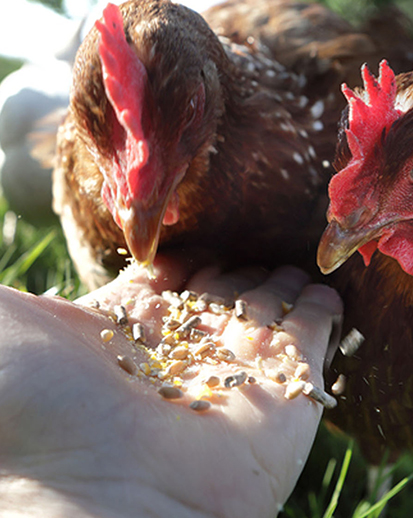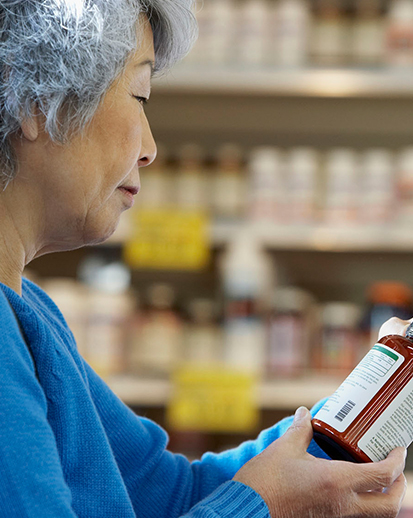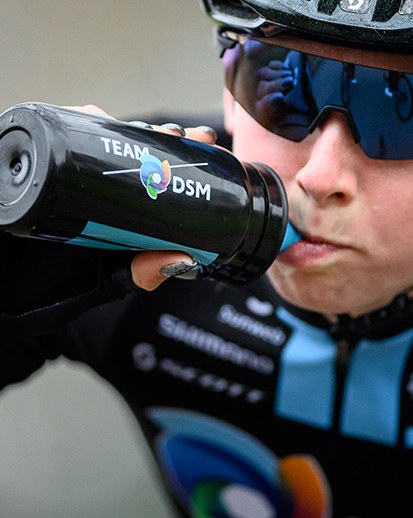Report on progress in 2020
Our strategy served us very well in 2020. It helped us to set our priorities in order to drive organic growth, especially in view of the rapidly changing circumstances brought about by the COVID-19 pandemic. It also helped us make the right capital allocation choices, including the selection of acquisition targets and the development of our nutrition portfolio, where appropriate.
Highlights:
- We completed the integration of two acquisitions (CSK and Glycom), and started the integration of Erber Group into DSM.
- These three acquisitions valued together at €1.7 billion further strengthen our ‘global products, local solutions’ business model as well as the Precision part of our business model by acquiring Romer Labs as part of the acquisition of Erber Group.
- We announced the divestment of our Resins & Functional Materials and associated businesses
- We executed two change programs, ‘Agility to Grow’ in Materials and ‘Fit for Growth’ in DSM Nutritional Products, to support profitable growth through process simplification and improved alignment with market needs
- Enhanced our platform-based approach to driving innovation, ensuring a healthy pipeline of new products and solutions
- Delivered against our purpose-led sustainability ambitions in people and planet
Progress in Sustainability: People and Planet
At DSM, sustainability is not only our core value and a key responsibility it is also an important business driver that is fully engrained in our purpose, strategy, business and operations. Our approach for bringing about positive change is to improve, enable and advocate. See below an overview of our progress on our key sustainability metrics:
2 We estimate that the effect of the underlying cumulative structural improvements in absolute GHG emissions was approximately 18% in 2020, versus the 2016 baseline. The total cumulative absolute reduction was 25%, versus the 2016 baseline.
3 For a small percentage of sales (<0.6% of sales) classified as Brighter Living Solutions, the environmental impact is considered ‘best in class’ together with other solutions
We have leading positions in important ESG indices for investors: we hold a platinum sustainability medal from EcoVadis putting us in the top 1% of our industry, we are already ranked first out of 120 companies in our industry by Sustainalytics, have an AAA rating from MSCI, have Prime Status with ISS-ESG, and have a leading position in the rankings of Vigeo Eiris.
Planet
We further improved the environmental impact of our own operations and are well on track with respect to our greenhouse gas (GHG) reduction, energy efficiency and purchased renewable electricity targets.:
- The underlying structural improvement in absolute greenhouse gas reduction from operations in 2020 compared to the 2016 baseline is ~18%, versus our target of 30% by 2030
- Energy efficiency has improved by 5.7% compared to full year 2019 versus our >1% average annual ambition.
- 60% of purchased electricity came from renewable resources compared with 50% in 2019, firmly on course to achieve our interim target of 75% by 2030 in the pursuit of 100%
This progress supports our commitment to a long-term pathway to work toward net-zero GHG emissions across our operations and value chains by 2050. We are also proud to be globally recognized for our leadership in Sustainability. Our climate change strategy received an A rating and an A- for our water stewardship from CDP, the global non-profit environmental disclosure platform.
We enabled our customers to deliver more sustainable solutions to their (end) consumers focusing on the domains of Nutrition & Health, Climate & Energy, and Resources & Circularity. Our purpose-led innovation pipeline is fully aligned with our five focus SDGs. We launched a new strategic initiative to lead a robust transformation in sustainable animal protein production worldwide, and we unveiled our ‘Products with Purpose’ brand strategy in human nutrition. We halved the carbon footprint of Akulon® PA6, one of our key thermoplastic material products, and introduced bio-based Dyneema®.
More about our environmental performance can be found in the Planet section.
People
As the pandemic unfolded in 2020, taking care of our people became more important than ever. The resilience, engagement and care demonstrated by all of our employees has humbled us this year. We undertook a wide range of initiatives designed to support the physical, mental and emotional wellbeing of our people. In addition, we continued to work on safety and the engagement of our employees and to champion inclusion and diversity.
In terms of metrics we further improved the Frequency Index of DSM Recordable Injuries to 0.24 from 0.28 in 2019, achieving our target level of 0.25. We continue to strive to make our company fully incident- and injury-free. It was also pleasing to see that in such a challenging year we had a notable increase in Employee Engagement results (from 74% to 76%). On Inclusion & Diversity, we have made some progress on gender, with an Executive Committee ratio of 57% female, a Supervisory Board ratio of 42% female, a ratio of 21% female executives and under-represented nationalities ratio on executive level (30%). In 2020, we have broadened our continued journey to include pillars on generations, disability and LGBTQ+, with all five pillars being supported by highly engaged employee resource groups including: Rainbow Group, supporting LGBTQ+ colleagues; the Valuable group, supporting colleagues with disabilities; and the Black Employee Network at DSM called BLEND.
In terms of Organization, Leadership and Culture, we took the first implementation steps for the new P&O strategy at the end of 2020: we invested in our unique culture, with the launch of our Culture Compass, we piloted a new technology for career development, and launched a Hybrid Workplace concept for our ‘Next Normal’ way of working.
More information can be found in the People section.
Brighter Living Solutions
In 2020, 63% of our total group sales (continuing and discontinued operations) came from products that have a better environmental (ECO+) and/or social (People+) impact than mainstream solutions. We call these our Brighter Living Solutions. In 2020 we were able to qualify several additional solutions. This increase was offset by the disqualification of two significant solutions as part of our annual review process. These disqualifications were the result of an improved mainstream reference and changed supplier impacts. To better measure the sustainability impact of our product portfolio, we trialed a new methodology aimed at increased transparency and granularity. The approach was developed in 2019 and trialed in 2020. The methodology will be further refined in 2021 based on the feedback from the trials.
Progress in Digitization & Digitalization
With 157 bots automating numerous processes and more than 50 data analytics use cases implemented, we have created a solid basis to scale the benefits of advanced analytics and automation. The pandemic required us to accelerate the adoption of digital tools and practices among our workforce and laid down the key principles of new ways of working that will thrive in the ‘Next Normal’. We piloted with success our digital mindset change program in Latin America and China by inviting employees to learn, ideate and try out digital approaches more and more often. In the second part of the year, we combined the Nutrition strategy with digital imperatives to form an integrated transformation program that will shape, over the coming years, the digital Nutrition of tomorrow.
Brighter Living Solutions (BLS) is DSM’s program for the development of sustainable, innovative solutions with environmental and/or social benefits, creating shared value for our stakeholders. Brighter Living Solutions are products, services and technologies that, considered over their life cycle, offer a superior environmental impact (ECO+) and/or a superior social impact (People+) when compared to the mainstream alternative for the same application. The impact of Brighter Living Solutions can be realized at any stage of the product life cycle, from raw materials through the manufacturing process to potential re-use and end-of-life disposal.
Within the program, DSM conducts an annual ‘Product Category Sustainability Review’ for all product categories. This review identifies environmental and social impact differentiators and risks for each of our product categories and confirms the mainstream reference solution. To substantiate the identified differentiators DSM uses comparative Life Cycle Assessments (LCAs) and/or expert opinions to determine whether a product has a superior performance and can be identified as a Brighter Living Solution.
Primary energy is energy that has not yet been subjected to a human engineered conversion process. It is the energy contained in unprocessed fuels.
Final (consumed) energy is the energy that is consumed by end-users. The difference between primary energy and final consumed energy is caused by the conversion process between the two as well as any transmission losses.







